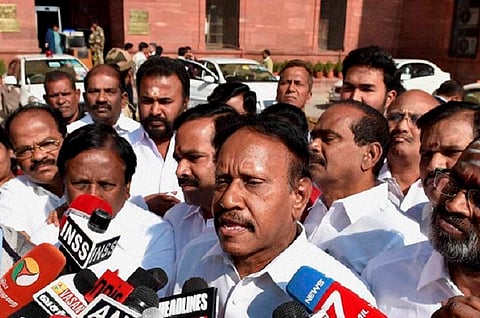

AIADMK Lok Sabha MP and Deputy Speaker Thambidurai’s speech in Parliament about social justice, in the context of the government’s bill for 10% quota for ‘economically weaker sections’, has gone viral. While it’s unclear how the MP voted at the end of the debate – the bill was passed in Lok Sabha on Tuesday, with 323 MPs in support and only three against it despite several members calling it a political gimmick – in his speech he spoke about why ‘economically backward’ should not really be a criterion for reservations. And in doing so, he gave the House a history lesson on Tamil Nadu’s position on social justice for marginalised sections.
Stating that he was compelled to express his views since his fellow AIADMK MPs have been suspended by Speaker Sumitra Mahajan, Thambidurai began, “The government has now introduced the Bill regarding 10% reservation for the economically weaker sections. First of all, I want to know as to what is the purpose of reservation? Honourable Finance Minister has explained so many things. Why do you want reservation? The country requires reservation for social justice.”
Speaking about the caste system, and why the oppressive system has necessitated reservation for marginalised communities, Thambidurai said, “...in India, there is a Varna Ashrama system. In Manusmriti, so many castes are enumerated.”
“In that system, we have Brahmins, Kshatriyas, Vaishyas and Shudras. We are called Shudras. We are the lowest in the society. I am a Shudra and I am proud to be called a Shudra. Being Shudras, we have suffered a lot. For centuries, we suffered a lot and because of that, we asked for reservation policy for our upliftment. So many things like untouchability were there. For those reasons, the Dravidian Movement was started to fight for reservation,” he explained.
“Now this government wants to give reservation to the economical weaker sections. But you have already announced so many schemes for the economically weaker sections. All the governments, including BJP governments and Congress governments, have started so many schemes for the economically weaker sections,” he said, citing examples like the Mudra Yojana, Swabhiman scheme, Pradhan Mantri Awas Yojana, Deen Dayal Upadhyay Yojana and other rural development, housing and scholarship schemes.
“When the government has so many programmes to uplift the economically weaker sections, then why do you want reservation for them? I would say that you have failed to implement your programmes… That is why people are still economically weaker and this is why you are coming up with 10% reservation,” said Thambidurai.
Further explaining why it’s wrong to equate a person’s financial status and their social marginalisation, Thambidurai said, “[Dr Ambedkar] was highly educated. He was born in an SC community. He was employed in Mumbai. He was highly educated but how did people treat him? He was humiliated, despite his education.”
“That is why he said that reservation is important for the socially backward people,” he said, “In our country, the backward class people, especially Shudras, even after getting good education, are unable to achieve equality. Therefore, to achieve equality...the reservation policy was started in Tamil Nadu. The policy of reservation of seats in educational institutions and in government jobs for BCs, SCs, STs has a long history dating back to the year 1921.”
“Even the Justice Party was started at that time. It said that human beings must be respected equally. Caste must be removed so that a person is respected. People in society are being differentiated because of the caste system. The forefathers of our Constitution took the word ‘social’ and not ‘economic’ as a criterion for providing reservation. So, whatever law the government is intending to make now is going to be struck down by the Supreme Court. The government is not going to succeed on this,” he asserted.
Thambidurai went on to talk about Periyar, the Justice Party and the evolution of the Dravidian movement that is premised on social justice.
“Even after more than 70 years of our Independence, caste system is prevalent in our country. In order to get rid of casteism, the first thing that we have to do is to empower the lower caste people. That should be our motive. In our state of Tamil Nadu, nearly 90% of people belong to the backward and most backward and SC/ST communities. Only 10% of the population belong to the upper caste. Only because of this movement we could secure justice for all those people belonging to lower castes, SCs and STs,” he said, adding that the introduction of the Ninth Schedule to the Indian Constitution enabled the 69% reservation in the state today, despite the Supreme Court capping it at 50%.
“Certain sections of people are still not recognising the Shudras. That is the problem for us. They are not accepting us. If we go to villages, there is a two-tumbler policy existing there. Dalits cannot take water in the canteen. That is happening. So, first you think of the Scheduled Castes and bring policies so that they can come up economically. Only then can we resolve this problem,” he said.
Thambidurai also pointed out that economic criterion is bound to change at any time whereas ‘casteism is a permanent curse in this country’. While it may help in elections, the MP expressed confidence that the Bill would not pass legal muster before the apex court.
Watch: